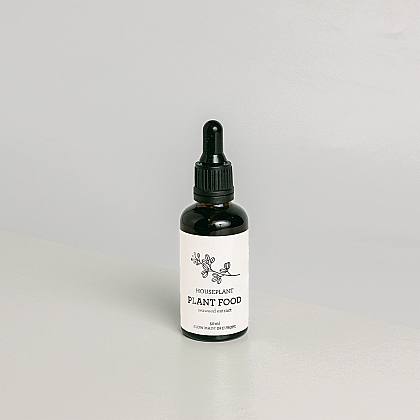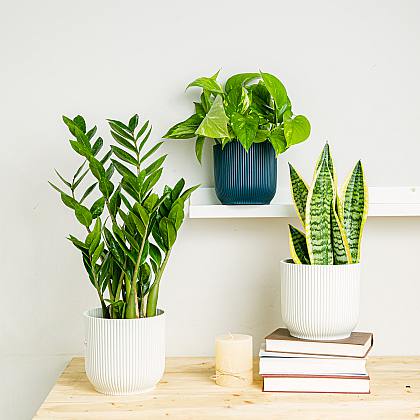How to keep your plants alive during the winter
Caring for plants is a task that requires constant attention, especially during the winter months. Extreme cold, lack of sunlight, and humidity can all negatively affect the health of our plants
Caring for plants is a task that requires constant attention, especially during the winter months. Extreme cold, lack of sunlight, and humidity can all negatively affect the health of our plants. However, with a few helpful tips and a little effort, we can keep our plants alive and healthy through the winter. In this article, we'll provide you with some practical tips for caring for your plants in winter. From choosing the right plants for winter weather to protecting them from extreme cold and keeping them free of pests and diseases, you'll learn everything you need to know to keep your plants happy and healthy during the colder months of the year.
Choose Plants Suitable for Winter
When it comes to caring for your plants in winter, it is essential to choose the right species for this season of the year. Some plants are more cold-hardy and can survive without problems, while others are more sensitive and require more care. It is important to research and know the needs of each plant before purchasing it. Some ideal choices for winter are firs, hollies, cyclamens, and pansies. These plants have the ability to withstand low temperatures and continue to bloom during this time of year. In addition, it is also advisable to opt for perennials, as they retain their foliage throughout the year and are not affected by the change of season. Annuals, on the other hand, usually die with the onset of winter. By choosing winter-friendly plants, you'll be ensuring their survival and reducing the amount of extra care you'll need to give them. Remember to consult with experts or research the characteristics of each plant before purchasing it, so you can enjoy a colorful and healthy garden throughout the winter season.
Create the right environment for your plants
In order for your plants to survive in winter, it's important to create an environment that's right for them. First, you need to make sure they're getting the right amount of sunlight. In winter, the days are shorter and the light intensity is lower, so you may need to move your plants to a window that receives more light or add special plant lamps. In addition, it is important to maintain a suitable temperature for your plants. Many tropical plants don't tolerate cold temperatures, so be sure to keep them away from cold drafts and near a heat source if necessary. On the other hand, some plants can be sensitive to overheating, so you should keep them away from direct heat sources, such as radiator grilles. You should also be aware of the humidity of the air in your home, as dry air can damage leaves and make plants more susceptible to pests and diseases. If your home has low humidity in winter, you can place a humidifier near your plants or put them in trays of water to increase room humidity. In short, creating a suitable environment for your plants during the winter can be crucial to keeping them alive and healthy.
Regulate the amount of water your plants receive
Regulate the amount of water your plants receive
One of the most important aspects of caring for your plants in winter is to properly regulate the amount of water they receive. During this season, it is crucial to avoid overwatering, as the plants have slower growth and less need for water. It's important to look at the soil before watering and make sure it's dry to the touch before watering again. In addition, it is advisable to water in the warmest hours of the day to prevent the water from freezing during the night. It's important to remember that each type of plant has different water needs, so it's critical to do your research and learn about the specific preferences of each species. A handy trick to check if your plants need water is to stick a finger into the soil up to the second joint: if it comes out clean and dry, then it's time to water. However, if it comes out wet or with soil debris stuck to it, it's best to wait a few days before watering again. By properly regulating the amount of water your plants receive during the winter, you'll provide them with optimal conditions to survive and stay healthy until spring arrives.
Protect your plants from the extreme cold
During the winter, plants are especially vulnerable to cold temperatures and a lack of sunlight. Therefore, it is important to protect them from extreme cold to prevent them from being damaged or killed. An effective way to protect your plants is to cover them with special landscaping blankets or fabrics. This will help retain heat and maintain a stable temperature around the plant. It is important to ensure that the cover is not in direct contact with the plant, as this can cause freezer burn. In addition, it is necessary to remove the cover during the day to allow the plant to receive sunlight and fresh air. Another way to protect your plants is to place them in protected areas, such as porches or garages. These locations provide a warmer and more stable environment for your plants during the colder days of winter. If you have potted plants, you can also move them indoors during colder days. However, it is important to make sure that the plants are located near windows to receive enough sunlight. In short, protecting your plants from extreme cold is critical to keeping them alive and healthy during the winter. Covering your plants with blankets or special gardening fabrics and placing them in protected areas are two effective ways to do this.
Keep Your Plants Free of Pests and Diseases
Keeping your plants free of pests and diseases is essential for their survival and health. In winter, plants are more susceptible to disease due to humidity and lack of sunlight. It's important to regularly inspect your plants for any signs of pest or disease infestation. If you notice any signs, such as spots on leaves or insects on branches, act quickly to prevent them from spreading. An effective way to prevent infestation is by making sure your plants are clean and free of dead leaves or broken twigs. Additionally, it is advisable to maintain good drainage in your pots to avoid overwatering, which can attract insects and fungi. You can use home remedies such as insecticidal soap or neem oil to combat pests without harming your plants. However, if the infestation is severe, it's best to seek professional help to avoid damaging your plants further. In short, by keeping your plants clean and monitoring their health regularly, you'll be able to avoid most of the pests and diseases that can affect them during the winter.
Don't forget to fertilize your plants in winter
Don't forget to fertilize your plants in winter
Winter can be a challenging time for plants, as many of them enter a dormant state. However, this does not mean that we should neglect their diet. Although plants may need fewer nutrients during this season, it's important to remember the importance of fertilization even in winter.
During the cold months, plants may struggle to absorb nutrients from the soil due to low temperatures and reduced watering. Therefore, it is advisable to use slow-release fertilizers that provide a steady supply of nutrients over time. These fertilizers are especially beneficial in winter, as they prevent overfeeding and minimize the risk of damaging plant roots.
In addition, it is important to choose a suitable fertilizer for each type of plant. Some species may require a higher nitrogen content to stimulate vegetative growth, while others may need a higher ratio of phosphorus to potassium to strengthen their roots and resist the cold.
It is advisable to follow the manufacturer's instructions when applying fertilizers, avoiding excess or lack of nutrients. In addition, it is preferable to fertilize during the warmest days of winter and avoid doing so when frost or extremely low temperatures are expected.
In short, don't forget to fertilize your plants in winter. Providing them with the necessary nutrients during this season will help keep them healthy and ready to bloom when spring arrives.
Prune regularly to stimulate growth
Regular pruning is an important practice to keep your plants healthy and encourage their growth during the winter. Pruning involves cutting off dead or diseased branches and leaves to promote the development of new branches and stronger leaves. Pruning can also help control the size and shape of the plant, which is especially helpful if you have potted plants or small spaces.
However, it's important to remember that not all plants need to be pruned regularly. Some plants can suffer damage if pruned too much, while others may require more aggressive pruning to grow properly. Be sure to do your research on the specific needs of each plant before you start pruning.
When you're ready to start pruning, be sure to use sharp, clean tools to avoid damaging the plant. Cut branches just above a node or shoot to encourage growth in that area. You can also trim the larger leaves to allow light to reach the smaller leaves underneath, which can improve photosynthesis and overall growth.
In short, regular pruning can be a very beneficial practice to keep your plants healthy and stimulate their growth during the winter. However, it is important to research the specific needs of each plant before you start pruning and to use sharp, clean tools to avoid damaging the plant.
In short, taking care of our plants during the winter requires special attention and care. By choosing suitable plants, creating a conducive environment, regulating the amount of water, protecting them from extreme cold, keeping them free of pests and diseases, fertilizing them, and doing regular pruning, we can ensure that our plants survive and stay healthy during this season. However, we must not forget that each plant is unique and may require specific care. Every garden is different and presents unique challenges. It is important to be attentive to the individual needs of our plants and adapt our care accordingly. Gardening is an ongoing process of learning and experimentation, so there's always room to explore new techniques and discover more ways to keep our plants alive and healthy during the winter


